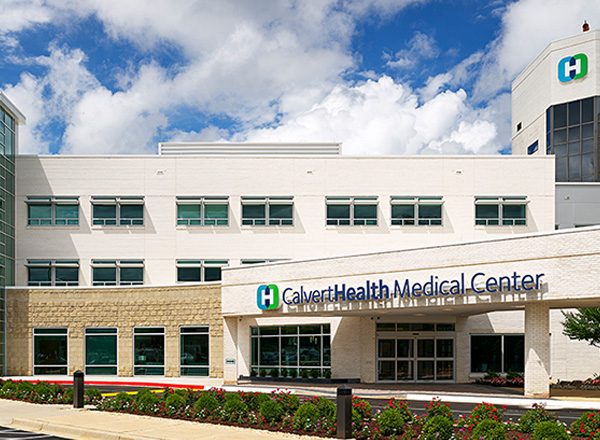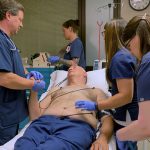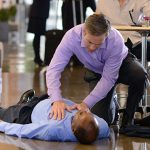For over 100 years, CalvertHealth Medical Center has cared for the residents of Prince Frederick, Maryland, growing from a rural setting accessed via dirt roads to a community center point with 130 beds and over 1,200 employees. While smaller in size compared to counterparts within the Washington D.C. metropolitan area, CalvertHealth has continued to grow and adapt to the diverse needs of its community, from implementing mobile health centers for underserved patient populations to adopting innovative medical technologies.
Shifting the Focus
As the hospital grew, the leadership team embraced a culture of continued quality improvement, earning CalvertHealth high rankings from U.S. News & World Report, and gaining the title of #1 Hospital for Patient Safety in the Washington area in 2014. Likewise, staff education and clinical competency became a strategic focus. Wendy Cox, BS, MA, CTRS, CPR Coordinator for CalvertHealth, described the need for a new approach to CPR education, “One of the things that we really wanted to do our homework on was time-saving … Because we are a small hospital, we don’t have an unlimited supply of people. If you pull three nurses out of a department to come to a [CPR] class … that’s a lot of cost … Because you need to have somebody that replaces them.”
As Wendy embarked on her search for CPR education solutions, she discovered the Resuscitation Quality Improvement® (RQI®) program from the American Heart Association, delivered by RQI Partners. “I started reading more about RQI and the low-dose, high-frequency training … As an educator, I recognized that [the program] is the way to cement learning,” she reflected.
Finding Space
Initially, Wendy expressed concerns regarding the space limitations within CalvertHealth’s facility. “We don’t have a lot of training space … or physical space on our units for an RQI Simulation Station,” she explained. Her RQI Partners Impact Manager, a dedicated customer success representative, introduced her to the RQI-P GO Simulation Station, a modular unit that provides the essential elements required to successfully participate in RQI or HeartCode Complete® programs.
In addition to providing the same high-quality resuscitation education as the traditional RQI Simulation Station while allowing for organizational cost savings, RQI-P GO also provides program participants with added convenience by enabling learners to manage their CPR skills in-house, in cases where they normally would travel to another location to do so. Wendy was thrilled to learn more about the solution. “All I need is a little table … and I can put it wherever I want … It really resonated with me as a way to go,” she explained.
Saving Time and Expanding Support
Within a month of adopting the program, Wendy quickly recognized the positive shift in staff viewpoints regarding resuscitation education. “I’ve heard a lot of comments from staff about how much they appreciate this program and how much easier it is and less time-consuming … which is a real satisfier for them,” she explained. “I had someone come over this morning to complete [her] ACLS [skills]. It probably took her longer to go back and forth across the parking lot than it did to actually complete the program. It’s such a time-saver.”
Additionally, Wendy appreciated the personalized support provided by her Impact Manager throughout the implementation process. “The whole process has been really seamless … Our [Impact Manager] was usually back with information the same day, which is a satisfier for me because it’s a satisfier for my end user. They didn’t have to wait a long time to get the right answers,” she recalled.
Benefits of Mastery Learning
Wendy looks forward to continuing CalvertHealth’s journey to resuscitation excellence and is inspired by the long-reaching benefits of the program. “We are really about the health of our community … Low-dose, high-frequency is the way to go in improving outcomes because we get better response, better reaction time … they have those skills fresh in their mind all the time.”
The RQI-P Go Simulation Station enables healthcare systems, like CalvertHealth, to provide the RQI® and HeartCode® Complete programs to learners who may not have access to a primary location with traditional Simulation Stations. The modular station provides similar benefits to the traditional Simulation Station, including:
- Educational Opportunities: Keeps CPR skills sharp with low-dose, high-frequency quarterly sessions, while allowing healthcare providers and non-clinical staff to stay on-site without having to travel to a training facility.
- Mastery Learning Design: Enhanced audio and visual coaching with real-time feedback to support continuous improvement.
- Reporting: RQI Analytics measure compliance and competence at individual and group levels.
- Measurement Capability: Learning technology that measures Quality CPR metrics.
- Learning Management System: Capable of integration with Target Solutions and other 3rd party content providers.
- Support: Gain on-going personalized and site-specific support from our Customer Success Team.
To learn more about the RQI-P GO Simulation Station or to discover the full suite of solutions for both in-hospital and prehospital resuscitation education needs, visit: RQI-P GO Simulation Station (rqipartners.com).









